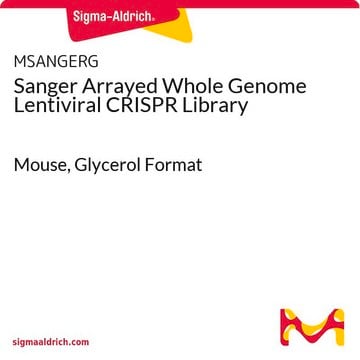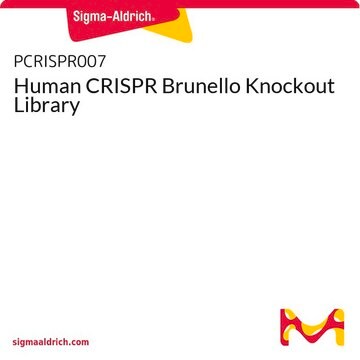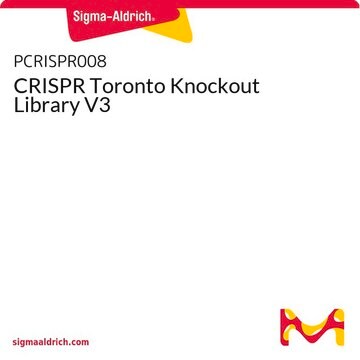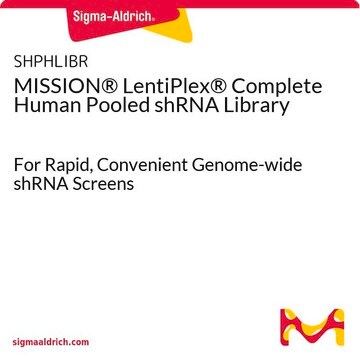HSANGERV
Sanger Arrayed Whole Genome Lentiviral CRISPR Library
Human, Virus Format
About This Item
Produits recommandés
Niveau de qualité
Conditionnement
pkg of 10 μL (384-well plate)
Concentration
1x106 VP/ml (via p24 assay)
Application(s)
CRISPR
Conditions d'expédition
dry ice
Température de stockage
−70°C
Vous recherchez des produits similaires ? Visite Guide de comparaison des produits
Catégories apparentées
Description générale
Application
Caractéristiques et avantages
- Vector: U6-gRNA/PGK-Puro-2A-BFP (gRNA only)
- Simplify the workflow with puromycin selection
- Illuminate CRISPR-expressing cells with BFP
Additional Features
- Better, not bigger: Two optimized clones per gene reduces the time, cost, and scale of screening experiments
- Ready-to-screen: Clones are arrayed in a robotics-friendly 384-well format for high throughput screening
- Collaborative: Real-time, library validation continues
For detailed information on the Sanger library, click here
Conditionnement
Composants
Request a Quote or More Information
Forme physique
Autres remarques
Produits recommandés
Informations légales
Code de la classe de stockage
12 - Non Combustible Liquids
Classe de danger pour l'eau (WGK)
WGK 3
Point d'éclair (°F)
Not applicable
Point d'éclair (°C)
Not applicable
Certificats d'analyse (COA)
Recherchez un Certificats d'analyse (COA) en saisissant le numéro de lot du produit. Les numéros de lot figurent sur l'étiquette du produit après les mots "Lot" ou "Batch".
Déjà en possession de ce produit ?
Retrouvez la documentation relative aux produits que vous avez récemment achetés dans la Bibliothèque de documents.
Articles
This screening guide covers how to choose a cell line, a screening library, and experimental conditions as well as tips for designing and performing your experiment.
Genome-wide screening with optimized gRNAs per gene ensures specific and efficient knockout, controlling time and cost.
Get tips for handling lentiviruses, optimizing experiment setup, titering lentivirus particles, and selecting helpful products for transduction.
Protocoles
Learn about Sanger Sequencing steps or the chain termination method and how DNA sequencing works and how to read Sanger Sequencing results accurately for your research.
Découvrez les étapes de la méthode de Sanger ou séquençage par terminaison de chaîne, le fonctionnement du séquençage de l'ADN, et apprenez à lire précisément les résultats d'un séquençage Sanger pour vos propres recherches.
FACS sorts cells based on light scattering and fluorescence for objective cell analysis.
Notre équipe de scientifiques dispose d'une expérience dans tous les secteurs de la recherche, notamment en sciences de la vie, science des matériaux, synthèse chimique, chromatographie, analyse et dans de nombreux autres domaines..
Contacter notre Service technique






